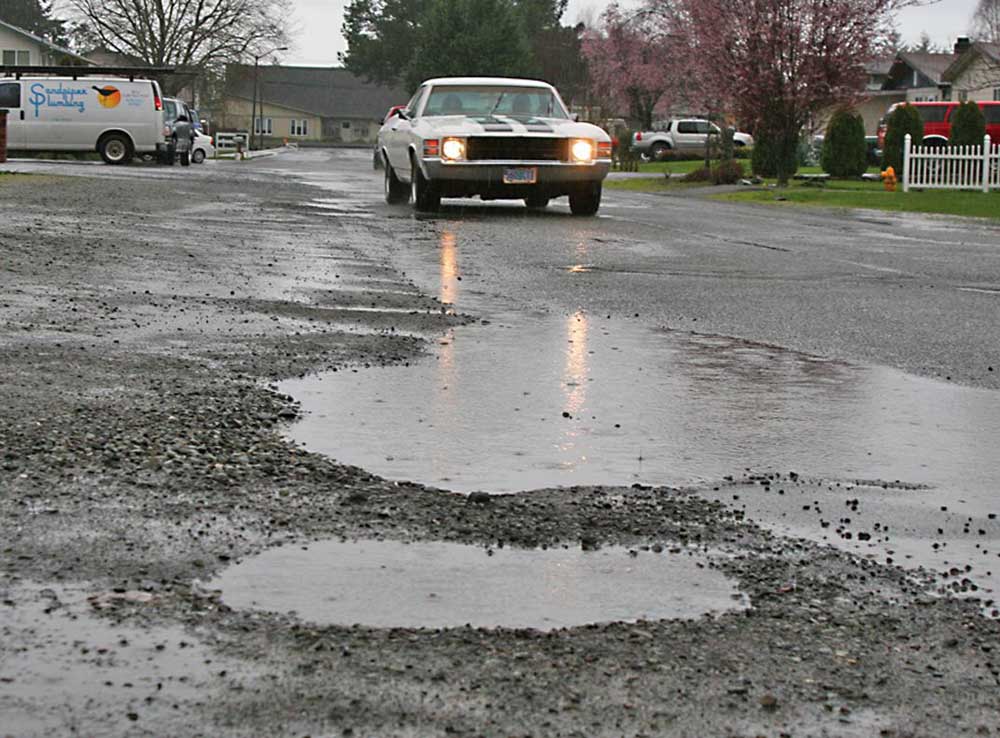Bend transportation committee eyes $100 million bond, gas tax
Published 12:00 am Thursday, November 1, 2018

- A car navigates rain-filled potholes in Bend. (Bulletin file photo)
Bend should use a combination of money-raising tools, including a road bond, local option levy, gas tax and higher vehicle registration fees, to pay for hundreds of millions of dollars worth of transportation improvements by 2040, a city group recommended Wednesday.
The city estimates it will need about $412 million for new road projects by 2040, not counting projects in the approximately 2,400 acres that will be annexed in the same time span. Existing funding sources, which include the state highway fund, dollars from the city’s general fund and garbage franchise fees, are expected to provide about $189 million, leaving a gap of nearly $223 million.
At least $100 million of that could come from a voter-approved bond, under a plan recommended Wednesday by a subgroup of Bend’s transportation advisory committee that would still need approval from the whole committee and the City Council.
Together with a gas tax, a transportation utility fee, increased developer fees and a sales tax on prepared food and beverages, the bond could pay for most improvements.
Several of these proposals would result in raising taxes and require a citywide vote. Bend voters soundly rejected a 5-cent-per-gallon gas tax in 2016, but committee members hope a tax targeting tourists will be more popular.
One suggestion is to charge a flat 3 cents per gallon throughout the year and bump it to 5 cents during the summer and winter. Karna Gustafson, a committee member and the vice president of governmental affairs for the Central Oregon Builders Association, said she thought that proposal would fail because it seems disingenuous.
“I’m still having a little heartburn over it because if we’re calling it seasonal we really shouldn’t be charging anything during the shoulder season,” she said.
Committee member Suzanne Johannsen, a financial adviser and a former city councilor, said she was interested in pursuing a tax on the number of miles people drive in lieu of a gas tax.
A program being tested statewide with more than 1,000 participants has drivers attach an electronic transmitter to their cars, tracking the number of miles they drive and how much they pay in gas tax. Those drivers are then charged 1.7 cents per mile. If they pay more than that in gas tax, they get a refund.
It’s still only a pilot program, so enacting that kind of tax statewide or specifically in Bend would require new legislation.
Johannsen said she also wanted the city to pay attention to road maintenance. The $223 million funding gap only applies to new road construction, not ongoing maintenance on existing streets.
Bend has about $80 million in deferred maintenance on city streets, and the longer the city takes to repair roads, the more extensive those repairs will become. Bend’s pavement condition index — which measures road quality on a scale of 1 to 100, with 100 being a brand new road — began dropping near the start of the Great Recession and slowly climbed to 71, still shy of the city’s goal in the low 80s. Roads with a higher pavement condition rating can be maintained with relatively cheap treatments like slurry seal, which seals cracks and protects pavement, but roads that have degraded may need to be completely repaved or even rebuilt.
“I live on a dirt street, and the streets around me haven’t been overlaid for 30 years,” Johannsen said. “I think maybe we don’t have the maintenance budget we need.”
Much of the money dedicated to street maintenance during Bend’s most recent two-year budget cycle came from one-time funds or draining the city’s reserve accounts, said City Manager Eric King.
“We are still searching for more sustainable revenue for maintenance,” King said.
A local option levy, which requires approval from voters and would be assessed through property taxes, is one option the group recommended to address the $80 million backlog, but it likely wouldn’t work for ongoing street maintenance. While residents pay for both a bond and a levy through their property taxes, a bond is specifically for new construction and a levy can be used to fix existing roads.
The fuel tax, sales tax and transportation utility fee could be used more flexibly for new projects or improvements to existing ones.
A sales tax and fuel tax would require citywide votes, while a utility fee could be passed either by a citywide vote or a vote by the City Council.
A transportation utility fee would apply to all houses and employers, so it would include large public or nonprofit institutions including Bend-La Pine Schools and St. Charles Bend that cause a lot of trips on Bend roads but don’t have to pay property taxes.
— Reporter: 541-633-2160; jshumway@bendbulletin.com








